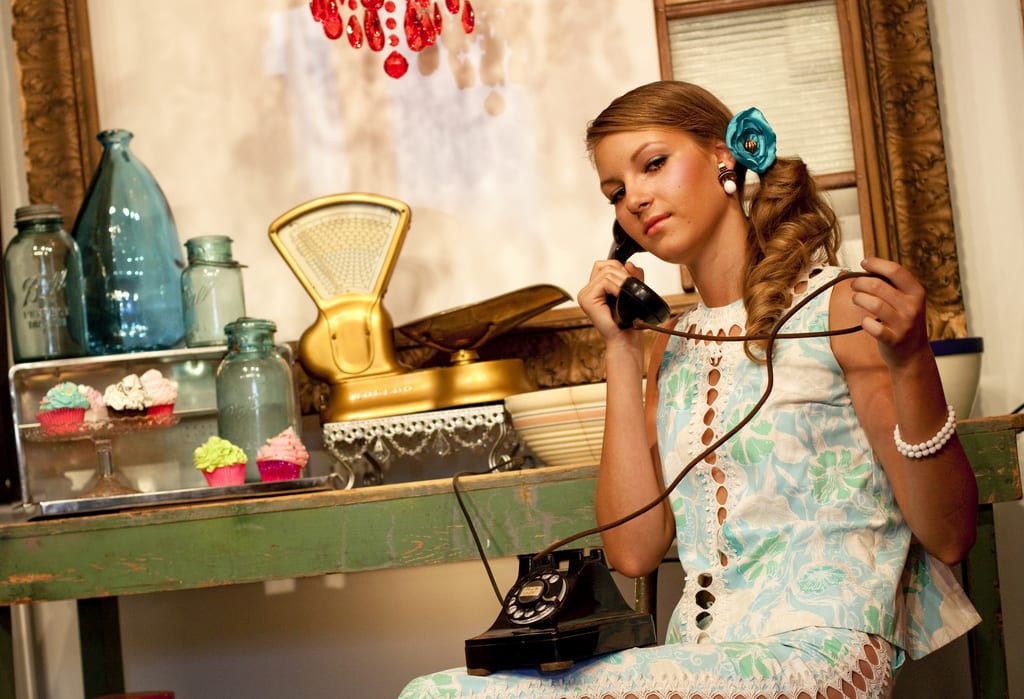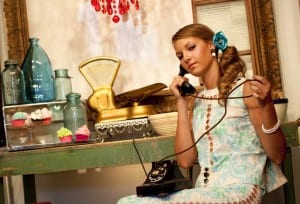How to become a vintage fashion dealer

With the explosion of interest in vintage fashion over recent years, more and more people are jumping on the bandwagon to make money. But how do you make a profitable business from vintage items? We talk to two dealers.
A passion for vintage is essential
Lynda Stead, 52, is owner of travelling clothes stall Vintage to Vogue, which has been trading for nine years. After a variety of jobs and originally training as a career officer when she left university, she started collecting vintage. The company is based in Leeds and Lynda says her criteria for what she buys are that she ‘just has to love it’.
Lynda says “For anyone wanting to get into vintage fashion my biggest piece of advice would be to do it because you love it not because you think it is the way to make your fortune! Collect and sell what interests you, be it home-wares, fashion, material etc. I am a firm believer that you can only be genuine if you are passionate about what you do.”
“I never really thought about turning the collecting into a business. I still don’t class myself as a dealer as I really love my clothes, who they belonged to, what event they were worn for etc. I did not begin to collect or to stand fairs solely as a way of making money as a business. I began selling to finance my passion and I also liked meeting fellow vintage enthusiasts at fairs, some of which have gone on to become good friends.”
Be prepared to put effort into finding great vintage clothes
While it may seem that vintage is everywhere, gathering stock for your vintage business can be harder than it seems. “It has become increasingly difficult to find vintage clothing at reasonable prices over the last few years” explains Lynda.
“The explosion of vintage shops, vintage internet shops and the increasing number of individuals selling at fairs means that so many people are looking for what is, by definition, a finite supply of clothing.
“I used to find so much in charity shops but now most of the main charities have their own dedicated vintage departments which in a lot of cases are way too expensive for me to buy from.
“Car boot sales used to be another good source but again people are asking high prices for items because they either know there is a demand or they have read articles that say vintage is popular, so they perceive their items must be worth a lot. Consequently I spend most of my time driving round and round visiting charity shops and car boots in the hope of finding just one good item.”
Be prepared for difficulties and have a clear business plan
Susie Burne, 26, is founder of online site and travelling stall, Memoir Vintage, and is a shining example of the hard work it takes to become a successful vintage dealer. She’s been running Memoir Vintage for thirteen months, and has a fashion degree. She worked as a recruitment company sales manager, before she was made redundant and decided to concentrate on a vintage business. The company is based in Wrexham and specialises mostly in evening wear.
“It was either all or nothing so I decided to go for it head first. I used a small business loan to get stock and to open up a small unit in Quiggins in Liverpool, which is basically like a small shop in a large building shared by many small businesses. Unfortunately four months later I had to close the shop as the overheads were too high and there was not the right customer walking through the door. This was a big knock as I was failing before I began. I needed help.
“I called the Princes Trust who told me they could help and show me the right direction. I signed up and went on a number of business courses and had help from business advisors and even got to present Memoir business to Prince Charles himself. I was advised to go down the online route by the Princes Trust which was the most valuable and best advice I could have asked for as www.memoirvintage.co.uk was born! To this day the vintage business is tough and hard, especially because so many people have begun to trade in the vintage world, I always think ‘will vintage run out?’ but I don’t think it can as the next decade will always be next!”
Make contacts in other countries to give your stock a unique edge
The next step is to make contacts all over the world, if you have something different than what is available in the UK, you’re more likely to attract customers. Not only this, but it will also give you an advantage over your competition. Susie explains; “Our stock comes from all over the world, we have contacts in Europe and America who know what it is we are looking for and who hand select pieces for us, and in the UK I travel far and wide and select pieces which I know Memoir’s customer will love.
Get handy with a sewing machine
“Quite a lot of the vintage pieces which are found have great potential but need some TLC to bring them up to date. Most of which may just need the hem to be taken up from a maxi to mini or maybe the sleeves to be taken off” says Susie.
“Sometimes we find vintage pieces which have no hope. However the garment is made from an unusual material which may have a gorgeous print. In this case we will still buy the piece but completely take it to pieces and remake a dress with the material. Ideas come from the latest trends of the catwalk”
“The best advice I could say is try and look towards fashion trends, so many business try to start out in the vintage fashion industry because they think there is easy money to be made but this won’t work unless you know what your customer wants.”
